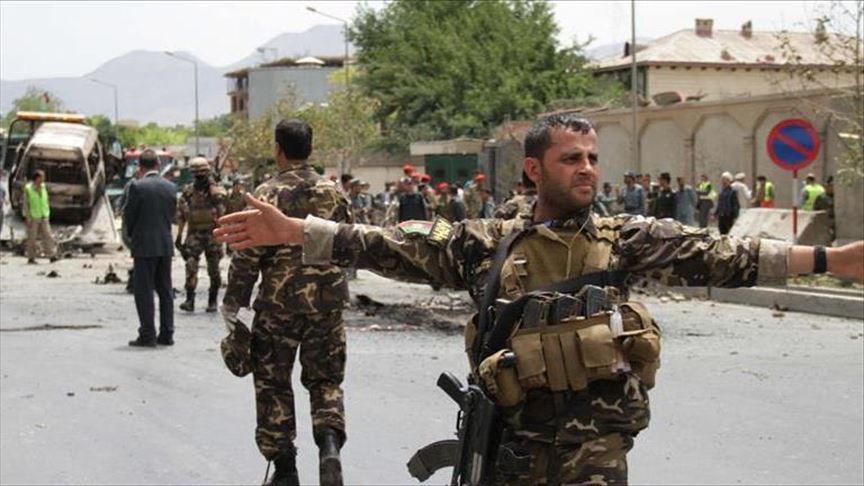At least 200 Afghan civilians killed in Ramadan
Fighting escalated across Afghanistan as warring sides adopt fierce offensive posture amid negotiations for peace
 file photo
file photo
KABUL, Afghanistan
As the Taliban continued to engage in a series of symbolic reconciliation parleys, the raging war with no eminent signs of truce in Afghanistan killed an estimated 200 more civilians during the Muslim holy month of Ramadan alone.
Figures compiled by Anadolu Agency suggested a string of landmine blasts, suicide attacks, targeted killings and air raids left at least 200 civilians killed and more than 300 wounded in the restive Helmand, Ghazni, Nangarhar, Jawzjan, Paktika, Ghor, Badghes, Zabul, Kunduz, Herat, Faryab, Sar-i-Pul, Kapisa, Baghlan, Maidan Wardak, and Kabul provinces in the Muslim holy month of Ramadan that began on May 6.
The capital city, Kabul, alone was rocked by three terrorist attacks in the last week of May killing six soldiers and five civilians, while injuring over 20 civilians. However, Ghazni remained the most volatile province of all 34 provinces in the country this month.
During the month of Ramadan, 33 Afghan children and 14 women were killed, while 34 more children and 9 women got injured in different violent incidents, said the Civilian Protection Advocacy Group, a network of 20 civil society institutions.
Under the newly appointed interior and defense ministers, Massound Andrabi and Assadullah Khalid respectively, the Afghan security forces have been rejuvenated and molded into a relatively aggressive posture against the resilient insurgents.
The Afghan security forces managed to reclaim the restive Deh Yaq district in Ghazni province this month after nearly two years of the Taliban control over it.
The security forces and the Taliban on Sunday made tall claims about killing around 100 fighters of opposite sides in central Ghazni province amid an evident surge in fighting.
The Ministry of Defense boasted it has killed 160 members of the Taliban’s so-called “Red Unit” of fighters in Ghazni and Maidan Wardak provinces this month.
The Taliban, on the other hand, opened new fronts such as in central Ghor province, where 18 security forces were killed last week. In neighboring Badghes province, the insurgents managed to recapture Bala Murhab by killing at least 12 security forces at the check posts on the outskirts of the volatile district.
The country’s former spy chief, Rehmatullah Nabil, told a news conference in Kabul on Sunday more deadly clashes are on the cards as the Taliban seek to have an upper hand in proposed peace talks with the U.S.
‘Taliban shying away from ceasefire’
In the wake of mounting social and diplomatic pressure on the Taliban for ceasefire combined with intensified air and ground offensives by the Afghan forces, the insurgents adopted equally aggressive posture both on the diplomatic as well as the war fronts this month.
Mirza Mohammad Yarmand, a Kabul-based security affairs analyst, argued the Taliban are shying away from announcing a ceasefire on the occasion of Ramadan or Eid al-Fitr on the directives of their foreign backers.
“No one should expect us to pour cold water on the heated battlefronts of ‘Jihad’ or forget our forty-year sacrifices before reaching our objectives”, said Taliban leader Mawlawi Hibatullah Akhundzada, in a message ahead of Eid al-Fitr.
He blamed the Afghan government for trying to sabotage dialogue between the Taliban and Afghan political figures “by seeking prominence”.
It is with a clear reference to the multiple rounds of talks in Moscow between the insurgents and the Afghan politicians from the opposition groups where the Kabul government had no official representation.
Responding to this, Zalmay Khalilzad, the top U.S. peace negotiator, said in a series of tweets that the Taliban leader's Eid statement provides some welcome support for the peace process, and a desire to participate in dialogue with other Afghans and in a final political settlement that will require power sharing.
“At the same time, the statement’s bombastic tone is unnecessary & only serves to complicate & disrupt as we advance peace talks. The statement suggests the US seeks violence. We do not. The level of violence in Afghanistan is unacceptable and we have no desire to perpetuate it,” Khalilzad added.
Waheed Mujda, an expert on the Taliban affairs, told Anadolu Agency there is strong opposition among the ranks of the Taliban towards the idea of a ceasefire at this stage.
“They [Taliban] present presence of foreign troops in Afghanistan as a justification for the continuation of fighting. Last year, when the Taliban entered brief ceasefire, many top leaders of them [Taliban] did not like it,” he said.
The Taliban and the U.S. envoy are set to resume political wrangling in the Qatari capital Doha later this month on ways and means to end this 18-year-old war.
Anadolu Agency website contains only a portion of the news stories offered to subscribers in the AA News Broadcasting System (HAS), and in summarized form. Please contact us for subscription options.







